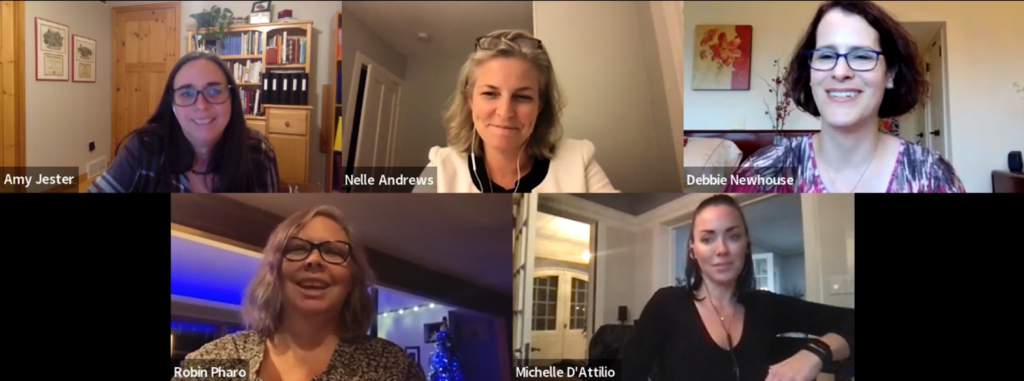Already a member? Log in to the Member Site at members.mastery.org.

Demystifying Mastery Learning: A Conversation with Utah Educators
October 27, 2021
From Refugee to Entrepreneur: My Mastery Learning Journey
April 5, 2022Parent Perspectives on Mastery Learning


Empowering. Motivating. Authentic. Meaningful…Don’t worry.
These were the closing sentiments of MTC parents in our last talkback of 2021. At 6pm ET on Thursday, December 2, caregivers from Wisconsin to Connecticut and the Bay Area gathered virtually to discuss their students’ journeys to mastery learning, with an eye toward college and workforce success. Parents shared their preconceptions about mastery learning, the moments that won them over, and their learners’ current progress at schools like New York University. The conversation was moderated by Debbie Newhouse, a parent at Khan Lab High School.
You’re not taking a risk with your kid’s future. You’re actually giving them a gift.

When Amy Jester, a parent at Clark Street Community School (CSCS), summarized her go-to explanation of mastery learning, the head nods among the six-person panel were visceral. Jester, a former professor at University of Minnesota, spoke to how her son is “learning how to learn.” The insights her son gained about how he learns best empowered him to work independently toward National Merit recognition in association with the PSAT. Jester also cited how proactive he is in asking teachers for help and seeing them as resources.
Newhouse amplified that point, noting that her son has a “comfort in knowing ‘okay, I’m going to be working with this educator…until I understand it.’ It’s not just ‘okay, I got the grade’ and [then I] walk away.” She is thrilled that her son can rely on the skill set developed through his high school mastery learning experience as he enters his first semester at Massachusetts Institute of Technology (MIT).
Robin Pharo, also of CSCS, chimed in: “These kids are…more prepared for higher level work than you are if you come out of a traditional high school setting.” Michelle D’Attilio of Pathways High, also in Wisconsin, echoed this point. She and her daughter, Sophie, a freshman at New York University, are “very pleased” with how she has transitioned to NYU. Sophie had previously worried that her high school experience learning “in a different way” would not translate to college. However, the “true life skills” that mastery learning fostered helped Sophie step into the unknown and figure things out so that the rigorous, urban university is “a lot easier than expected.”
Nelle Andrews, a teacher at Miss Porter’s School where her daughter is enrolled, regularly pushes back on the notion that mastery learning does not prepare students for the real world where there are deadlines and penalties. “If we think that there’s a finish line for a certain skill, we’re selling our students short and ourselves short.” “How often do we get graded in everyday life? In my profession, I’m successful or I’m not.” Pharo doubled down on Andrews’ point and added how little testing does to predict one’s life success.

Matt D’Attilio was careful to highlight that mastery learning schoolwork is hard. He spoke to the rigor of project-based learning and how his children were not motivated by a grade, but by actual learning. Pharo spoke to how her son “progress[ed] from ‘I want to get by’ in a class to ‘I want to go back’ [and master]” that competency. As an upperclassman, he regularly returned to revise and improve his work. Furthermore, he embraces struggle and does not melt down if he does not get things right away.
This is a thirty-year story, not a temporary [one].

D’Attilio emphasized that the education sector is playing the long game with mastery learning, seeking to help Generation Z embrace the unknowns of the future. Jester noted that the reflection and engagement that mastery learning forces are vital for this generation’s success. It’s no longer “I got an A on that,” but a different way of “interacting and taking ownership over your own learning.” A competency-based model “helps students become more accountable.”
Jester shared that, at CSCS, all students must do public presentations about what they learned and how they grew. Mastery learning “forces them to reflect…and engage” in order to demonstrate the credits they’re earning. “You can’t just sit back and do the work and forget it.” She added that mastery learning afforded her son a deep understanding of how he learns as well as the ability to assess the fit of potential colleges. “It wasn’t me applying to college, it wasn’t ‘we’…as the student, he’s driving the process completely.”

Newhouse described the way she uses e-commerce as an analogy when explaining the Mastery Transcript to other parents, “You don’t buy a phone that’s an ‘A+’…you read reviews and details…that level of detail and sophistication is just being applied to our student’s experience.” She contrasts this with the black and white printout her daughter used for college applications, “the same [one] you could have gotten in 1961.”

MTC parents participating in this talkback shared how they came to appreciate mastery learning by observing the various ways this approach helped their learners grow, develop agency, and become more engaged. In their experience, while the learning journey was not a straight road, the peaks outnumbered the valleys. These parents found solace in their children’s capacity to productively struggle through the valleys. In their words, mastery learning is an “empowering, motivating, authentic, and meaningful” struggle. “Don’t worry.”




